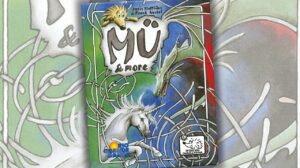Glass Garden – Andrew Lynch
In Glass Garden, you cultivate a garden of succulents while contending with a pesky interloper, one variety of pest or another. Whether a snail, an ant, a worm, or a fly, they all try to get in your way. None of the included pests is a cat trying to eat your succulents, so I can’t quite relate. Like most Button Shy solo designs, Glass Garden offers a satisfying puzzle, though I found this one easier to master than expected. Unlike my beloved ROVE, or even Button Shy’s other recent solo release A Nice Cuppa, Glass Garden doesn’t compel me to return, though I had a great time figuring it out.
Ease of entry?
★★★★☆ – The odd bump or two
Would I play it again?
★★★☆☆ – Wouldn’t suggest it, but would happily play it
Read more articles from Andrew Lynch.
Mü & more: Revised Edition – Justin Bell
Our team accidentally picked up not one, but two copies of the updated trick-taking game Mü & more: Revised Edition at fall conventions last year. That meant my buddy Andrew Lynch wrote a full review of the game a couple months ago, and now I’m here to share my brief thoughts on the update as well. (Mü & more—then called Mü & More, to continue its attempts to confuse me by switching up the capitalization of the second word here—was first released 30 years ago.)
In 1995, I doubt that anyone screamed to the heavens that the world had too many trick-takers. But now, in a world where I play 1-2 new trick-taking games monthly? Mü & more feels right at home, because it is definitely a game for game players, core—maybe hardcore—hobbyists who are bored by the term “trump card.” Mü & more is so wild it confused me on almost every hand of my four-player game recently, with open cardplay to establish bids, team play, bid bonuses, minor trumps, major trumps, and supertrumps. (Yes, the world apparently needed more supertrumps.) One player consistently appeared confused at what suit was led, in part because trumps in Mü & more are their own suit and players can use either cards in their hand or cards on the table for each play.
Once a group sorts through the subtle changes to traditional trick-takers, Mü & more is a very interesting game thanks to team play. This might be one of my favorite “temporary alliances” games, now that I have tried it; in a round, you work with a teammate to win, but you kind of want that teammate to only be OK at their job, not spectacular. And that teammate might only be a partner for a round or two. The rules seem a little off with three players, but with four savvy card players, Mü & more makes for an excellent gift.
Ease of entry?
★★☆☆☆ – Not an easy onboard
Would I play it again?
★★★★★ – Will definitely play it again
Read more articles from Justin Bell.
Raising Chicago – Thomas Wells
I make a point of giving every Spielworxx venture a go, mainly because the games often don’t quite work, but they do compelling things. I’m excited that Capstone Games will continue to publish their output. Unfortunately, Raising Chicago works, but doesn’t do much that’s compelling.
Chicago had a series of cholera outbreaks from 1849 to 1867, and the game has you and the other players attempting to raise the city’s buildings out of the sewer-saturated streets. It’s a compelling idea that mostly translates to a series of nested area majority competitions.
The game has a very involved auction/bidding/resource gathering system, where you place tiles that simultaneously function as a bid, resource gatherer, and eventually, the building itself. Your losing bids give you more bid tokens in the subsequent round. If you win, your bids are placed onto the board and give the whole thing a wowie-zowie-3D feel. Unfortunately, if you’re playing with 4 players, the right moves feel pretty obvious, the entire city will get built, and the first player has a significant advantage. Left me with a very meh feeling, though this might be interesting for people who like counting blocks to see who has the most.
Ease of entry?
★★★☆☆ – There were a few questions
Would I play it again?
★★☆☆☆ – Would play again but would rather play something else
Read more articles from Thomas Wells.
Boxtop Pinball: Haunted House – Andy Matthews
Every year I run a board game convention called Nashville Tabletop Day which draws around 500 people from all over Middle Tennessee and surrounding states. We have publishers sponsor the event by sending us games that my attendees can “play to win”. This year, in addition to the over 190 games we received, we had two copies of Pandasaurus Games’ Boxtop Pinball: Haunted House. I had the chance to play a game or two and if you enjoy dice and crazy physics, then this one might be right up your alley.
Start with the packaging: this is the board game equivalent of a Russian nesting doll. Slide off the box sleeve and pull out boxes nested within boxes, each of them a “level” of the resulting pinball table, complete with bonus spots and hazards. After a brief set up, each player takes 4 of their 6 dice and flicks them off the “launch pad”, the highest spot on the table. The goal is to aim for bonus spots, or more importantly your opponents dice. After players have flicked all their dice, they add the face up numbers, including any multipliers, and include any bonus points they received that round. Play three rounds and you’re done.
It’s a dice game, so don’t come into it expecting deep strategy. If anything your main goal is to not flick your dice off the edge of the table—and maybe hope to get some points along the way. Really this game is all about celebrating old school pinball machines, and having loads of laughs. Pandasaurus Games hit the nail on the head with this one, and I hope they wind up releasing more in this line. I expect they’ll all be a hoot!
Ease of entry?
★★★★★ – No sweat
Would I play it again?
★★★★☆ – Would like to play it again
Read more articles from Andy Matthews.
The Gang – David McMillan
The Gang (2024, KOSMOS) is a co-operative game that puts the players into the shoes of bank robbers trying to pull off a series of heists. Each round of the game sees the players being dealt poker hands and then trying to silently communicate the strength of their developing hand of cards by using poker chips. Think The Mind melded with Texas Hold ‘Em poker. At least, that’s what I’m told. I have never played a single game of poker in my entire life.
In my fellow writer Justin Bell’s review of The Gang, he waxes ecstatic about this game and all the excitement it brings to the table. But, let me tell you, my experience was vastly different. I consider myself to be a pretty smart person, but as a poker neophyte, The Gang just made me feel stupid, and it left me feeling like I’d let everyone else at the table down time and time again. Those are feelings that I don’t enjoy, and they’re feelings I won’t be going out of my way to experience again.
Ease of entry?
★★☆☆☆ – Not an easy onboard
Would I play it again?
☆☆☆☆☆ – No chance
Read more articles from David McMillan.













Add Comment